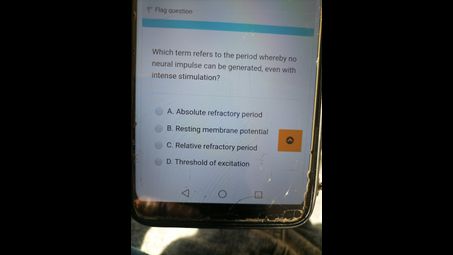Which term refers to the period where no impulse can be generated even with intense stimulation?
Which term refers to the period whereby no neural impulses can be generated even with intense stimulation

What else can I help you with?
Which term referes to the period whereby no impulse can be generated even with intense stimulation?
Absolute refactory period
What is the brief period during which a local area of an axon's membrane resists stimulation called?
The brief period during which a local area of an axon's membrane resists stimulation is called the refractory period. This period is important for preventing the axon from immediately firing another action potential.
Can the impulse of force be zero even the force is not zero?
Yes, it is possible for the impulse of force to be zero even if the force is not zero. This can happen if the force is applied for such a short period of time that the area under the force-time graph, which represents impulse, is zero.
What is it called when another neural impulse cannot occur?
THe absolute refractory period
Is impulse the same as momentum true or false?
False. Impulse and momentum are related concepts but not the same. Momentum is the product of an object's mass and velocity, while impulse is the change in momentum experienced by an object when a force is applied to it over a period of time.
Which term referes to the period whereby no impulse can be generated even with intense stimulation?
Absolute refactory period
Which term refers to the period whereby no impuls can be generated even with intence stimulation?
The term for the period where no impulse can be generated despite intense stimulation is known as the absolute refractory period. During this time, the cell membrane is unable to propagate another action potential, ensuring that signals are unidirectional and preventing the possibility of signal backflow.
What force applied over a period of time is called?
Force applied over a period of time has the dimensions of momentum, and is referred to as "impulse".
What is the period of time after a nerve impulse has been transmitted when it is not possible for another impulse to act upon the dendrite and the axon?
The Resting Period; over with in less than milliseconds.
The very brief moment following stimulation when a muscle remains unresponsive to additional stimulation is called the?
refractory period
How long does it take for dopamine to reset in the brain after a period of excessive stimulation?
It can take a few weeks to several months for dopamine levels to reset in the brain after a period of excessive stimulation.
What is impulse and how does it affect the momentum of an object?
Impulse is the product of force and time, causing a change in momentum. When a force is applied to an object for a period of time, it generates an impulse that changes the object's momentum. A larger impulse results in a greater change in momentum.
What is the force applied over a period of time is required to give a stationary object momentum called?
impulse
What is the brief period during which a local area of an axon's membrane resists stimulation called?
The brief period during which a local area of an axon's membrane resists stimulation is called the refractory period. This period is important for preventing the axon from immediately firing another action potential.
What does momentum do As impulse goes up?
As impulse increases, momentum also increases. Momentum is directly proportional to impulse, meaning that if the force acting on an object over a certain period of time (impulse) increases, the object's momentum will also increase proportionally.
Are impulse and momentum the same thing?
No, impulse and momentum are not the same thing. Momentum is the product of an object's mass and velocity, while impulse is the change in momentum of an object when a force is applied over a period of time. Impulse helps change an object's momentum.
How is momentum related ito impulse?
Momentum is the product of an object's mass and its velocity. Impulse, on the other hand, is the change in momentum of an object when a force is applied over a period of time. The relationship between momentum and impulse is described by the impulse-momentum theorem, which states that the impulse experienced by an object is equal to the change in its momentum.
